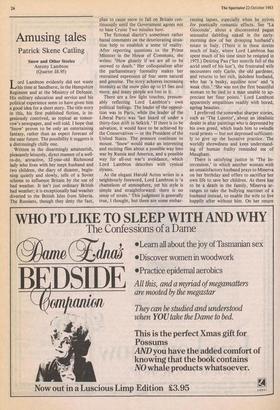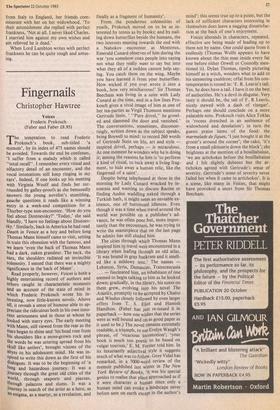Amusing tales
Patrick Skene Catling
Snow and Other Storks Antony Lambton (Quartet £6.95)
ord Lambton evidently did not waste L./his time at Sandhurst, in the Hampshire Regiment and at the Ministry of Defence. His military education and service and his political experience seem to have given him a good idea for a short story. The title story in this, his first published fiction, is in- geniously contrived, as topical as tomor- row's newspaper, and well told. I hope that 'Snow' proves to be only an entertaining fantasy, rather than an expert forecast of the near future. The possibility it suggests is a distressingly chilly one.
Written in the disarmingly amateurish, pleasantly leisurely, direct manner of a well- to-do, attractive, 32-year-old Richmond lady who lives with her inept husband and two children, the diary of disaster, begin- ning quietly and slowly, tells of a Soviet scheme to influence Britain by the use of bad weather. It isn't just ordinary British bad weather; it is exceptionally bad weather diverted to the British Isles from Siberia. The Russians, though they deny the fact, plan to cause snow to fall on Britain con- tinuously until the Government agrees not to base Cruise Two missiles here.
The fictional diarist's sometimes rather banal comments on the deteriorating situa- tion help to establish a sense of reality. After reporting questions to the Prime Minister in the House of Commons, she writes: 'How ghastly if we are all to be snowed to death.' Her colloquialism after the parliamentary formality makes her restrained expression of fear seem natural and genuine. The story achieves increasing intensity as the snow piles up to 15 feet and more, and many people are lost in it.
There are a few light touches, presum- ably reflecting Lord Lambton's own political feelings. The leader of the opposi- tion was in Paris, while the leader of the Liberal Party was 'last heard of under a thirty-foot drift in Selkirk.' If there is to be salvation, it would have to be achieved by the Conservatives — or the President of the United States. The pressure continues to mount. 'Snow' would make an interesting and exciting film about a possible way into war by Russia and America, and a possible way for all-out war's avoidance, which Lord Lambton describes with cynical slyness.
As the elegant Harold Acton writes in a neighbourly foreword, Lord Lambton is 'a chameleon of atmosphere, yet his style is simple and straightforward: there is no sense of strain.' This judgment is generally true, I thought, but there are some embar-
rassing lapses, especially when he strives for poetically romantic effects. See 'La Gioconda', about a discontented pagan sensualist dabbling naked in the early- morning dew of her drooping husband's estate in Italy. (There is in these stories much of Italy, where Lord Lambton has spent much of his time since he resigned in 1973.) Desiring Pan Cher nostrils full of the acrid smell of his lust'), the frustrated wife encounters only Carlo, the old gardener, and returns to her rich, indolent husband, who has 'a beaky, aquiline nose' and 'a weak chin.' She was not the first beautiful woman to be tied to a man unable to ap- preciate her finer points.' Lord Lambton apparently empathises readily with bored, ageing beauties.
I preferred the somewhat sharper stories, such as 'The Lunette', about an idealistic dealer in altar paintings who is depressed by his own greed, which leads him to swindle rural priests — but not depressed sufficient- ly to give up the lucrative practice. The worldly shrewdness and keen understand- ing of human frailty reminded me of Maugham.
There is satisfying justice in 'The In- tercession,' in which another woman with an unsatisfactory husband prays to Minerva on her birthday and offers to sacrifice her own life to save her children. As there has to be a death in the family, Minerva ar- ranges to take the bullying martinet of a husband instead, to enable the wife to live happily after without him. On her return from Italy to England, her friends com- miserate with her on her widowhood. `To their astonishment she replied with perfect frankness, `Not at all, I never liked Charles. I married him against my own wishes and am relieved he is dead.'
When Lord Lambton writes with perfect frankness he can be quite tough and amus- ing.















































 Previous page
Previous page